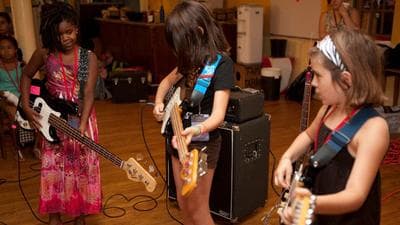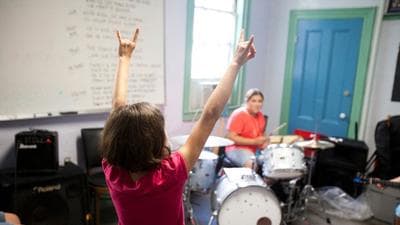Advertisement
Where Teachers Rock, But Girls Rule: Girls Rock Campaign Boston
Thirty-six years after The Runaways hit it big (at least in Japan) with “Cherry Bomb,” and decades since Bikini Kill’s debut, there is still something striking about a woman with an electric guitar. Female drummers are even rarer, and an all-women rock band is nearly the novelty it was 40 years ago. Yet the sight of a small girl hunched over a fretboard, ear cocked towards an amp that dwarfs her, is something more exotic and powerful still.
This vision is the norm at Girls Rock Campaign Boston, a feminist nonprofit with roots in the punk, riot grrrl, and DIY (do-it-yourself) movements. Co-founders Nora Allen-Wiles and Hilken Mancini met in 2007 as volunteers at Rock n’ Roll Camp for Girls in Portland, Oregon, the first in a now rapidly proliferating collection of programs aimed at empowering girls and women through rock music.
The central philosophy, explains Allen-Wiles, is that “you don’t have to be perfect. It’s something that girls are taught constantly: they should be perfect at everything, they should be scared to make noise, if they don’t know the right answer, they shouldn’t raise their hand.”
Consequently, the teaching style at Girls Rock is experiential and positive, with emphasis on self-esteem and collaboration. “The music is sort of a vehicle,” says Emily Arkin, a volunteer instructor and Director of Identity and Archives. “A way for your voice to be heard, a means of self-expression.”

The Jamaica Plain-based program, which consists of two week-long summer sessions each culminating in a showcase at Brighton Music Hall in Allston, has remarkable success instilling basic proficiency in even novice instrumentalists. (This year’s final showcase is on Saturday, August 17 at 1 p.m.) Many of the girls, who range from ages 8 to 17, are raw beginners at the start. But by the end of the week each and every one has formed a band, written a song and performed it on stage.
“It’s a system where they get playing right away,” Arkin says. “It also takes away a lot of inhibitions that people might have, like, ‘I have to wait until I can play well to play loud.’ We make them play loud right away.”
With countless studies showing that boys are far more likely than girls to speak up in the classroom, the mandate for girls to make noise is no small thing.
Each week begins with an introductory assembly in which the girls meet each other, form bands, and brainstorm names. (Past examples include The Femmes, Spiral Control, and Mostly Harmless.) The days are long and packed, with two hours of instrument instruction in the morning followed by songwriting workshops and band practice. In between are lessons in self-defense and stage presence. Games, skits, and empowerment exercises, such as Punk Rock Aerobics (exactly what it sounds like), pepper the program. In classes that combine all ages and skill levels, older girls are often drafted to assist in teaching.
The Girls Rock approach stands in stark contrast to music education in most public schools, where classical music reigns supreme, technique is emphasized, and the will of a teacher or conductor is paramount. Many children do not get the opportunity to collaborate musically until middle or high school.
“I loved all the classical music instruction I had growing up and I loved having music in the public school system and I wouldn’t trade that back,” says Arkin, who played violin as a child. “But I also definitely got a perfectionistic streak from it. I went through a lot of juried auditions and very formal things. ... After I had been playing forever and was in a touring orchestra in college, I had a professor say to the concert master of our orchestra, ‘You’re finally just about at that point where you’ve mastered technique and now you can start to express yourself through the music.’ And I was like, what have we been doing here this whole time?”

In a curious, punk-inflected twist, it is the very rejection of such an achievement-based paradigm that enables girls to accomplish something that, in the words of Girls Rock students and teachers alike, borders on miraculous.
“In the end you’re always surprised at the outcome,” says Zoe Barbara, a 17-year-old from Swampscott who attended her first session last summer and is now an intern.
“Everyone always comes up with a song, and everyone always learns how to perform it onstage. I’m always proud of the younger girls because they always come out with something great, even if they’ve never picked up the instrument in their life. It’s the confidence that [the instructors] put in us—that you can do it, it doesn’t matter what other people think.”
This article was originally published on August 12, 2013.
This program aired on August 12, 2013. The audio for this program is not available.